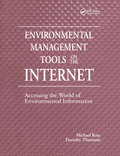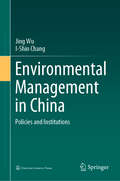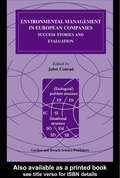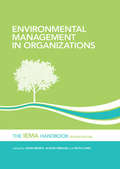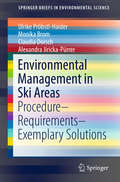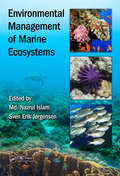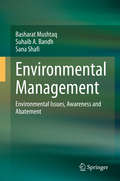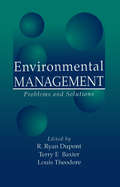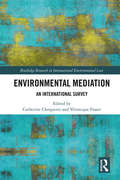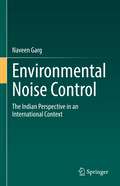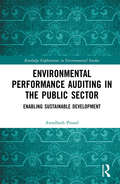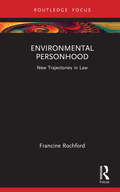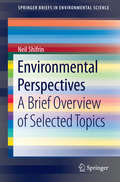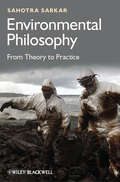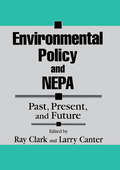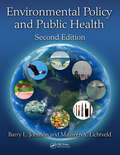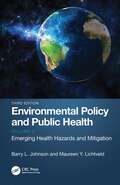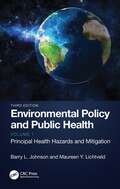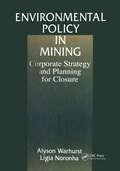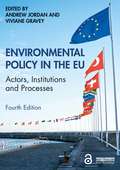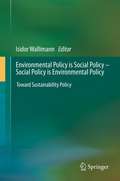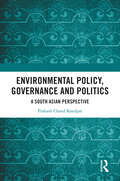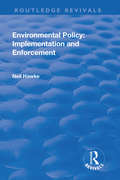- Table View
- List View
Environmental Management Tools on the Internet: Accessing the World of Environmental Information
by Michael KatzThis book provides general information about what is on the Internet and how to access it. It shows how o get environmental information off of the Internet. The book covers the database services that are available on the Internet that charge fees.
Environmental Management in China: Policies and Institutions
by Jing Wu I-Shin ChangThis book details various stages in the introduction, establishment and evolution of China’s environmental management system. By combining a literature review, comparative analysis, and case study, it investigates the environmental management system in several key periods in order to systematically assess the necessary measures and appropriate adjustments the Chinese Government implemented to reconcile the growing conflicts between economic development and resources conservation, in the context of rapid economic growth and economic transformation. Given its scope, the book offers a valuable resource for experts, scholars, and government officials in related fields.
Environmental Management in European Companies: Success Stories and Evaluation
by Jobst ConradOver the past decade, the greening of industry has become both an issue in scientific and political debate and a generic substantive development in industry itself. This study is the product of an international collaborative research project investigating exemplary cases of successful environmental management in European companies in Denmark, Germa
Environmental Management in Organizations: The IEMA Handbook
by John Brady Alison Ebbage Ruth LunnEnvironmental issues can present some daunting operational concerns for all types of organization, whether in the private, public and voluntary sectors. Managing them requires environmental professionals with a working knowledge of the rapidly developing body of regulatory measures. This new edition of Environmental Management in Organizations provides all the management tools, performance measures and communication strategies that organizations need to manage their environmental responsibilities effectively. Leading experts on each topic provide focused explanations and clear practical guidance, as well as setting out the context and the key environmental and management drivers. This edition significantly updates the original handbook to take account of developments in the environmental agenda, including new dedicated chapters on climate change, energy, transport, biodiversity and chemicals. Published with IEMA.
Environmental Management in Ski Areas: Procedure - Requirements - Exemplary Solutions (SpringerBriefs in Environmental Science)
by Ulrike Pröbstl-Haider Monika Brom Claudia Dorsch Alexandra Jiricka-PürrerThis book raises awareness of environmentally friendly and resource-sparing management of winter sports areas, in order to increase the number of certified ski areas. Many ski areas today are advertised with seals of approval, titles and awards. Often, however, it is unclear which institutions and criteria are behind these appraisals. This practice is widely criticized as “green-washing”, since a cautious use of ecologically and scenically sensitive mountain areas is more important now than ever. An environmental management system based on international or European standards ensures “real” improvements and external evaluation, but relies on the personal responsibility of the providers rather than on regulations imposed by authorities. This book contributes to developing a trustworthy and unified system for such evaluation, and one that can be applied internationally.
Environmental Management of Marine Ecosystems (Applied Ecology and Environmental Management)
by Md. Nazrul Islam and Sven Erik JørgensenEcosystem-Based Management (EBM) is one of the most holistic approaches to protecting marine and coastal ecosystems as it recognizes the need to protect entire marine ecosystems instead of individual species. After decades of pollution, habitat degradation and overfishing, now climate change and ocean acidification threaten the health of the ocean in unprecedented way. Environmental Management of Marine Ecosystems illustrates the current status, trends, and effects of climate, natural disturbances and anthropogenic impacts on marine ecosystems. It demonstrates how to integrate different management tools and models in an up-to-date, multidisciplinary approach to environmental management. This indispensable guide provides several case studies from around the world and creates a framework for identifying management tools and their applications in coral reefs, fisheries, migratory species, marine islands and associated ecosystems such as mangroves and sea grass beds. It discusses the physical and chemical compositions of marine ecosystems along with the threats and actions needed to protect them. The application of model framework to several contemporary management issues include the modelling of harmful algal bloom dynamics, understanding the dispersal of sea lice, and the possible impacts on intertidal communities of the provision of novel offshore habitat. The results of extensive research by an international team of contributors, the Environmental Management of Marine Ecosystems is designed to inform scientists, practitioners, academics, government and non-government policymakers on the particularities of marine ecosystems and assist them in understanding the EBM approaches in means of mitigation and adaptation of human activities that result in sustainability. These practices will help change the current methodologies used for resource assessment and the future regulations of marine resources.
Environmental Management: Environmental Issues, Awareness and Abatement
by Basharat Mushtaq Suhaib A. Bandh Sana ShafiIn the current age of science and technology, our lives have become dominated by countless scientific and technological innovations without which the earth would be a much poorer place. Life as we know would become absolutely bleak and boring without the inventions and advances being made all over the globe. In fact, scientific inventions, discoveries and innovations have ushered in a dramatic revolution in virtually every sphere of life. But at the same time, the skewed use of technology is at loggerheads with the environment. We, and our environment, now face a number of critical challenges and it is in response to this that we wrote this book to raise awareness for environmental issues and related management aspects. With a primary focus on Environmental Management – the rational reconciliation of man and nature, which involves the judicious exploitation and utilization of natural resources without disturbing the ecosystem’s balance – it will thus help to improve the relationship between man and environment. Moreover, it offers a wealth of ready-to-use material for advanced undergraduate and graduate students of Environment and Water Management. The book systematically addresses a range of key aspects, e.g. scientific principles, methods and ideas, as well as life-long learning skills for students. Further, it provides a solid foundation for applying scientific approaches to environmental problems.
Environmental Management: Problems and Solutions
by Louis Theodore R. Ryan Dupont Terry E. BaxterThere is a growing need to support undergraduate educators in the development of environmental management educational materials. Recognizing this need, the National Science Foundation funded a College Faculty Workshop on Environmental Management, that was conducted at Utah State University in July and August 1996. The principle objectives of the seminar were (1) to provide a meaningful course which would generate new ideas and innovative educational approaches in the emerging field of environmental management, and (2) to develop an applications-oriented problem workbook which would support undergraduate faculty involvement in the production of course materials. The result of this effort is Environmental Management: Problems and Solutions, an informative text on the essentials of environmental management.More than 200 structured problems presented in the book are meant to elicit a sound understanding of the basics of environmental monitoring, assessment and control. Detailed solutions to each problem, provided with each chapter, will prove useful to both the student and the instructor.This innovative text is a valuable resource for anyone involved in training of engineers and scientists in the field of environmental engineering.
Environmental Markets
by Terry L. Anderson Gary D. LibecapEnvironmental Markets explains the prospects of using markets to improve environmental quality and resource conservation. No other book focuses on a property rights approach using environmental markets to solve environmental problems. This book compares standard approaches to these problems using governmental management, regulation, taxation, and subsidization with a market-based property rights approach. This approach is applied to land, water, wildlife, fisheries, and air and is compared to governmental solutions. The book concludes by discussing tougher environmental problems such as ocean fisheries and the global atmosphere, emphasizing that neither governmental nor market solutions are a panacea.
Environmental Mediation: An International Survey (Routledge Research in International Environmental Law)
by Catherine Choquette Véronique FraserEnvironmental mediation continues to develop and evolve in different jurisdictions across the world in order to prevent potential environmental conflicts or to resolve the conflicts while avoiding the inherent drawbacks of an adjudicated solution. This book takes a comparative approach to explore the legal framework of environmental mediation with a focus on the judicial, administrative and private procedures and the criteria for accrediting mediators in a range of jurisdictions across the world. It also examines practical considerations for environmental mediators while analysing the effectiveness of different mediation processes.
Environmental Noise Control: The Indian Perspective in an International Context
by Naveen GargThis book provides a concise and up-to-date overview of environmental noise control issues, utilizing specific case studies from India to help explore noise mapping and monitoring, impact analysis, and policy, among other relevant topics. The book provides an extensive review of recent studies, including references, and describes the latest noise monitoring structures. It also addresses heretofore under-emphasized topics, including but not limited to acoustic metrology, Multi Attribute Decision Making (MADM) techniques, and sound insulation utilizing passive control strategies.
Environmental Performance Auditing in the Public Sector: Enabling Sustainable Development (Routledge Explorations in Environmental Studies)
by Awadhesh PrasadEnvironment and sustainable development challenges are a matter of global concern. Trillions of dollars of mostly public money are invested every year in domestic and international policies and programs to address these challenges. The effectiveness of these policies and programs is critical to environmental sustainability. Performance audits that examine the effectiveness of governmental policies and programs heavily influence their implementation. Despite this, performance auditing in the environment field has received very little academic attention. This book takes a closer look at performance auditing of public sector environmental policies and programs. It examines trends in global environmental performance auditing; and how it is currently practiced drawing on a global survey and case studies from Canada, India and Australia. In doing so, it identifies issues and challenges faced by Supreme Audit Institutions in undertaking these performance audits. This book will be of interest to students, scholars and practitioners of sustainable development, environmental auditing and public sector auditing as well as to donor organisations engaged in these areas.
Environmental Personhood: New Trajectories in Law (New Trajectories in Law)
by Francine RochfordThis book examines the increasingly widespread movement to recognise the environment as a legal person. Several countries have now recognized that nature, or parts of nature, have juristic personhood. In this book, the concept of legal personhood and its incidents are interrogated with a view to determining whether this is, or could be, a positive contribution to modern environmental problems. Surveying historical and current positions on the juristic concept of legal personhood, the book engages recent legislation and case law, in order to consider the attempt in several countries to vest personhood in rivers, river basins and ecosystems. Comparing approaches in a range of countries – including New Zealand, India, Ecuador, the United States and Australia, it addresses the methods employed, the purported aims, the mechanisms for enforcement, and the entrenchment of legal protections. Throughout, the book elicits the difficult relationship between an historically anthropocentric idea of personhood and its extension beyond the human; concluding that the attribution of personhood to the environment is an important, but limited, contribution to environmental sustainability. Accessibly written, this book will appeal to scholars, students and others with interests in environmental law, environmental science and public policy, and ecology more generally.
Environmental Perspectives
by Neil ShifrinThis short, readable book is intended as a big-picture introduction/overview for environmental students and lay-people involved with environmental issues. Every freshman in college intending to study environmental science should read it. It begins with a historical perspective on waste and environmental control. Basic instruction on some important fundamentals faced by environmental professionals every day, such as sampling, analysis, data visualization, risk assessment and forensic chemistry are provided in the following chapter. Important regulatory fundamentals, such as the National Contingency Plan, which is the U. S. regulatory framework for addressing hazardous waste is also defined. The book concludes with pertinent and provocative considerations on the future of environmental management, such as alternative approaches (technical impracticability), the "not-in-my-backyard syndrome," and the safety of chemicals in consumer products. The book contains many useful facts about waste production rates, energy use and recycling rates--all referenced to allow substantiation and provide a springboard for further research.
Environmental Philosophy: From Theory to Practice (Cambridge Studies In Philosophy And Biology Ser.)
by Sahotra SarkarThe first comprehensive treatment of environmental philosophy, going beyond ethics to address the philosophical concepts that underlie environmental thinking and policy-making today Encompasses all of environmental philosophy, including conservation biology, restoration ecology, sustainability, environmental justice, and more Offers the first treatment of decision theory in an environmental philosophy text Explores the conceptions of nature and ethical presuppositions that underlie contemporary environmental debates, and, moving from theory to practice, shows how decision theory translates to public policy Addresses both hot-button issues, including population and immigration reform, and such ongoing issues as historical legacies and nations' responsibility and obligation for environmental problems Anchors philosophical concepts to their practical applications, establishing the priority of the discipline's real-world importance
Environmental Policy and NEPA: Past, Present, and Future
by Ray Clark Larry CanterEnvironmental Policy and NEPA is a concise study of environmental policy-where we have come from, what we are facing and where we can go in the future. An outgrowth of initiatives taken by the Council of Environmental Quality (CEQ), and edited by the current Associate Director, this publication studies the effectiveness and efficiency of the implementation of the National Environmental Policy Act (NEPA).Divided into three main sections, part one covers the historical background and trends of NEPA. Part two addresses current substantive and conceptual issues associated with the environmental impact assessment (EIA) process. Part three discusses future opportunities including impact on humans, effective public participation in the EIA process and the need for sustainability.This excellent reference brings together 28 contributing authors who combine their expertise to address a multitude of topics. Environmental Policy and NEPA is mandatory reading for the professional, researcher, government policymaker, activist, student or anyone looking for a complete presentation of the EIA process.
Environmental Policy and Public Health
by Barry L. Johnson Maureen Y. LichtveldAs with the first edition, this second edition describes how environmental health policies are developed, the statutes and other policies that have evolved to address public health concerns associated with specific environmental hazards, and the public health foundations of the policies. It lays out policies for what is considered the major environmental physical hazards to human health. Specifically, the authors describe hazards from air, water, food, hazardous substances, and wastes. To this list the authors have added the additional concerns from climate change, tobacco products, genetically-modified organisms, environment-related diseases, energy production, biodiversity and species endangerment, and the built environment. And as with the first edition, histories of policymaking for specific environmental hazards are portrayed. This edition differs from its antecedent in three significant themes. Global perspectives are added to chapters that describe specific environmental hazards, e.g., air pollution policies in China and India. Also there is the material on the consequences of environmental hazards on both human and ecosystem health. Additionally readers are provided with information about interventions that policymakers and individuals can consider in mitigating or preventing specific environmental hazards.
Environmental Policy and Public Health: Emerging Health Hazards and Mitigation, Volume 2
by Barry L. Johnson Maureen Y. LichtveldWritten by environmental health experts with long teaching and professional careers in policy and public health, the third edition of Environmental Policy and Public Health comprises two volumes, addressing key physical hazards in the environment that impact public health. The first volume on Principal Health Hazards and Mitigation is complemented by the second volume, Emerging Health Hazards and Mitigation. Volume 2 discusses emerging health hazards and mitigation including environment-related infectious diseases, COVID-19 pandemic, social justice, and drugs and public health. New in this volume are a chapter on firearms violence as a public health hazard, a chapter on transportation and how built environments can affect human health and social well-being, and a chapter on noise and light pollution. As human populations increase and technology adds more devices to daily use that generate noise and light, adverse human and ecological health effects have become recognizable and require time-sensitive policy actions to mitigate and where possible prevent adverse health effects. Each chapter explains with great clarity how new environmental health issues are translated into public health policies. The volume concludes with case studies and practice questions to facilitate interactive learning for upper-level undergraduate and graduate students taking courses in public health and environmental sciences. The case studies and practice questions allow for a diverse portfolio of in-person and hybrid pedagogical strategies and tools at the fingertips of faculty who not only teach policy courses but whose course topics have policy relevance, such as climate and health.
Environmental Policy and Public Health: Principal Health Hazards and Mitigation, Volume 1
by Barry L. Johnson Maureen Y. LichtveldWritten by environmental health experts with long teaching and professional careers in policy and public health, the third edition of Environmental Policy and Public Health comprises two volumes addressing key physical hazards in the environment that impact public health. The first volume on Principal Health Hazards and Mitigation is complemented by the second volume, Emerging Health Hazards and Mitigation. The health of the environment is inextricably linked to that of people. Thoroughly updated, Volume 1 describes how the quality of air, water, and food is threatened by the presence of toxic substances and explains why climate change is a global health priority already impacting human health and the environment. The mitigations discussed in this volume are twofold: policies that are intended for control of specific hazards and suggested hazard interventions. The role of policy in addressing each of these key environmental health areas is extensively discussed in this volume as well. Each chapter explains step by step how new environmental health issues are translated into public health policies and concludes with practice questions to facilitate interactive learning for upper-level undergraduate and graduate students taking courses in public health and environmental sciences. The step-by step approach, as well as the case studies and practice questions, allow for a diverse portfolio of in-person and hybrid pedagogical strategies and tools at the fingertips of faculty who not only teach policy courses, but whose course topics, such as climate and health, have policy relevance.
Environmental Policy in Mining: Corporate Strategy and Planning
by Alyson Warhurst Ligia NoronhaEcological Management of Mining: Achieving Environmental Compliance is a study and comparison - global in scope - of current practices used by mining firms striving for ecological management. The author takes an integrated and interdisciplinary approach in addressing, analyzing and working towards solutions regarding the complex challenges posed by managing the environmental impacts of mining. The issues addressed range from the ecotoxicological effects of metal residues to the land use effects of mining and from socioeconomic impacts to environmental regulation. The goal of this book is to assist mining companies throughout the world to achieve environmental compliance and improve competitiveness in the context of growing environmental regulation and technological innovation. It is an essential book for the wide variety of professionals working on issues in mining. Like the book and the research itself, the audience is integrated and interdisciplinary including engineers, planners, ecologists, policy makers and economists.
Environmental Policy in the EU: Actors, Institutions and Processes
by Andrew Jordan Viviane GraveyThe European Union (EU) has a hugely important effect on the way in which environmental policies are framed, designed and implemented in many parts of the world, but especially Europe. The new edition of this leading textbook provides a state-of-the-art analysis of the EU’s environmental policies. Comprising five parts, Environmental Policy in the EU covers the rapidly changing context in which EU environmental policies are made, the key actors who interact to co-produce them and the most salient dynamics of policy making, ranging from agenda setting and decision making, through to implementation and evaluation. Written by leading international experts, individual chapters examine how the EU is responding to a multitude of different challenges, including biodiversity loss, climate change, energy insecurity, and water and air pollution. They tease out the different ways in which the EU’s policies on these topics co-evolve with national and international environmental policies. In this systematically updated fourth edition, a wider array of learning features are employed to ensure that readers fully understand how EU environmental policies have developed over the last 50 years and how they are currently adapting to the rapidly evolving challenges of the twenty-first century, including the COVID-19 pandemic. It is an essential resource for undergraduate and postgraduate students studying environmental policy and politics, climate change, environmental law and EU politics more broadly.
Environmental Policy in the EU: Actors, institutions and processes
by Andrew Jordan Camilla AdelleThe European Union (EU) has a hugely important effect on the way in which environmental policies are framed and implemented in many different parts of the world, but especially Europe. The new and comprehensively revised edition of this well-known textbook provides a state-of-the-art analysis of all the EU’s environmental policies. Comprising five parts, it covers the rapidly changing context in which EU environmental policies are made, the key actors who interact to co-produce policy and the most salient dynamics of policy making, ranging from decision making through to implementation and evaluation. Written by leading experts in the field, individual chapters examine how the EU is responding to a multitude of different problems including biodiversity loss, climate change, energy insecurity, and water and air pollution. They tease out the many important ways in which the EU's policies on these topics co-evolve with national and international environmental policies. In this third edition a mixture of learning features are employed to ensure that undergraduate and postgraduate students fully understand how EU policies in this vital area developed in the past and how they are now adapting to the rapidly evolving challenges of the twenty-first century.
Environmental Policy is Social Policy – Social Policy is Environmental Policy
by Isidor WallimannThis book argues that social and environmental policy should be synthetically treated as one and the same field, that both are but two aspects of the same coin - if sustainability is the goal. Such a paradigm shift is indicated, important, and timely to effectively move towards sustainability. This book is the first to take this approach and to give examples for it. Not to synthetically merge the two fields has been and will continue to be highly insufficient, inefficient and contradictory for policy and public administration aiming for a transformation towards a sustainable world. In general, social problems are dealt with in one "policy corner" and environmental problems in another. Rarely is social policy (at large) concerned with its impact on the environment or its connection with and relevance to environmental policy. Equally, environmental problems are generally not seen in conjunction with social policy, even though much environmental policy directly relates to health, nutrition, migration and other issues addressed by social policy. This book intends to correct the pattern to separate these very significant and large policy fields. Using examples from diverse academic and applied fields, it is shown how environmental policy can (and should) be thought of as social policy - and how social policy can (and should) simultaneously be seen as environmental policy. Tremendous benefits are to be expected.
Environmental Policy, Governance and Politics: A South Asian Perspective
by Prakash Chand KandpalThis book traces the development-environment discourse in India and examines the multi-layered interaction between society and nature in the light of the role of the state, judiciary and the civil society. Through an array of perspectives, the volume challenges the conventional approach to understanding the environmental politics in South Asia without considering the role of the civil society and other informal actors, which has radically altered the conventional articulation of the phenomenon.The volume underlines distinct structural characteristics of developmental politics in India and the social concerns and challenges which come in the way of environmental policy and governance in India. It is a meaningful intervention in unearthing significant socio-political and economic processes which are critical to the environmental governance in India. The book will not only be helpful in studying the state of policy, administration and politics of environmental discourse in India, but also guide the policymakers to explore the sustainable ways of environmental governance in South Asia.Insightful and lucid, this book will be useful to the students, researchers and faculty working in the field of political science, public administration, public policy, political sociology, political economy and governance studies. It will also be an invaluable and interesting reading for those interested in South Asian studies.
Environmental Policy: Implementation and Enforcement (Routledge Revivals)
by Neil HawkeThis title was first published in 2002. Environmental Policy is an astute and far-reaching text which analyzes the intersections between environmental policy formation and its ultimate implementation and enforcement through the law. It sets this theme against the axis of EU law and policy and UK law and policy, paying particular attention to the variables which determine the nature and significance of law as a delivery vehicle . Among these variables are the shape and character of EU and UK law for present purposes, alternatives to law, and the culture of UK law and policy aiding a distinct pattern of response to Directives, for example. It takes an informed look at the reality of implementation and enforcement through its reference to policy objectives as well as the limits and appropriateness of law across the aforementioned axis . An indispensable resource for scholars and students of environmental law and policy, along with governmental and other environmental agencies responsible for policy creation, implementation and enforcement.
